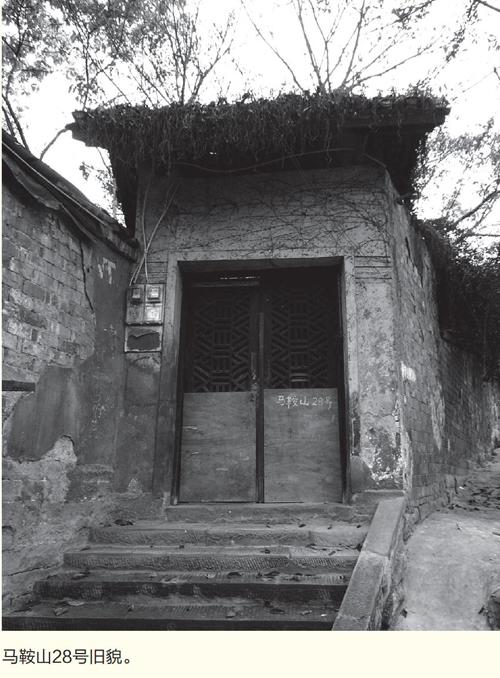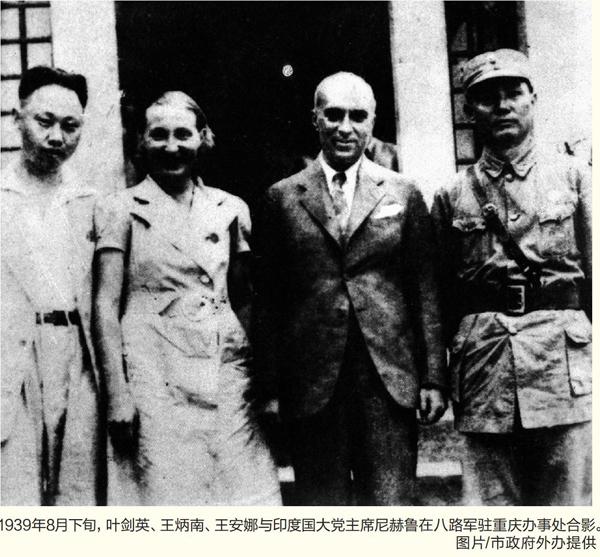王炳南王安娜夫妇住所“马鞍山28号”中国共产党最早外事机构重要办公地
2021-08-23郑犁
郑犁



重庆市人民大礼堂旁,有一处因两头高、中间低,形似马鞍的地形而得名的“马鞍山”,这里有多座精致小院和多栋洋楼等民国时期建筑,抗战时期沈钧儒、李公朴、沙千里、茅盾、王炳南等知名爱国进步人士在此居住活动。而马鞍山28号,这幢始建于1930年代的建筑因王炳南、王安娜夫妇在此居住办公,成为中国共产党最早外事机构重要办公地。
20世纪30年代,重慶久裕钱庄经理李正铨在马鞍山修建了3栋小楼,自上而下分别以他3个儿子李忠良、李忠孝、李忠厚名字起名“良庄”“孝第”“厚庐”。“厚庐”后来成为沈钧儒住所,旁边的“良庄”则被中共中央南方局外事组以王炳南、王安娜夫妇的私人身份租下开展工作。这里逐渐成为以周恩来为书记的中共中央南方局同各民主党派、进步民主人士聚会、座谈,共商国是的重要场所。
1927年“四·一 二”反革命政变后,国民党大肆屠杀中共党员,从1927年到1928年上半年,被杀害的中共党员和革命群众达31万多人,年轻的中国共产党遭受着前所未有的考验。在这危急时刻,1927年8月7日,中共中央政治局在汉口召开紧急会议,史称“八七会议”。它给正处在思想混乱和涣散中的中国共产党指明了新出路,中国共产党的工作重心开始由城市转向农村。然而,中共的根据地被国民党重重包围,当时除了与苏联共产党有秘密交往以外,失去了与世界各国政府和组织交往的条件,国际社会对中国共产党的主张和根据地的真实情况知之甚少。
1937年卢沟桥事变爆发后,日本帝国主义发动全面侵华战争,中国共产党和国民党开始由武装敌对转变为合作抗日,国共第二次合作逐渐形成,中国共产党的政治地位也由“地下”慢慢变得“公开”。因首都南京沦陷,国民政府迁都重庆,重庆一度成为当时中国的军事、政治、经济、文化中心和国际反法西斯力量远东指挥中心。美、苏、英、法、澳等30多个国家在重庆设立使馆,中美、中苏、中英、中缅、中越等10多个文化协会,塔斯社、路透社、国民先驱报等世界著名通信社、报社以及反法西斯国际机构、团体先后在重庆设立派驻机构,世界各国使者、知名人士和国际民间团体频繁来渝,这为中国共产党充分利用国共第二次合作形成的有利条件,走出延安,走向全国和海外,大力开展外事工作提供了便利。
1939年中共中央南方局在重庆成立之始,就建立了对外宣传小组(1940年12月改称“外事组”),这便是中国共产党最早的外事机构。外事组受周恩来直接领导,周恩来回延安时,由董必武或王若飞领导,统筹开展国际外交工作。外事组组长王炳南,陕西乾县人,1926年加入中国共产党,并担任乾县第一任党支部书记。1929年,王炳南赴日本留学,后又转德国柏林大学就读。抗日战争时期,王炳南在中共中央南方局外事组任组长,从事统一战线、国际宣传和外事工作。根据周恩来“广交朋友、深交朋友”的指示,王炳南利用自己在重庆的住所—马鞍山28号,广泛接触各国使馆人员和记者,阐明中国共产党的立场,揭露国民党反动派的反共真相,他还组织外事组工作人员编辑大量外文宣传材料,通过德籍妻子王安娜托国际友人带到国外。乔冠华、龚澎、陈家康、章汉夫、章文晋这些新中国的外交官都曾在外事组工作过。
在重庆期间,外事组积极组织开展工作,在与世界各国各界在华人士密切交流中提供有关中国抗日战争的材料,宣传中国共产党的主张,努力让国际社会尤其是美、英等国尽可能多地了解中国抗战的真实情况,在广泛结交国际上有影响的外国名流,扩大国际统一战线,冲破国民党反动派政府的种种限制、干涉,团结国际友人,争取国际上广大民主进步力量的同情和支持,最终取得抗战胜利中发挥了非常重要作用。中共中央南方局外事组在对外宣传、外事活动、对外斗争等诸多方面都积累了初步经验,培养了一批外事干部,为新中国开展外交活动打下了坚实基础。
图片/重庆中国三峡博物馆提供
编辑/杨艳
Next to Chongqing People's Auditorium, a mountain, named 'Maan Shan' in honor of its saddle-like terrain with two ends high and the center low, is dotted with many exquisite courtyards and multi-storey houses dating back to the Republican period. Prominent patriotic and progressive personages such as Shen Junru, Li Gongpu, Sha Qianli, Mao Dun, and Wang Bingnan lived and worked there during the War of Resistance against Japanese Aggression. A house, located at 28 Maan Shan and built in the 1930s, became a key office for the earliest foreign affairs agencies of the Communist Party of China, as Wang Bingnan and Anna Wang lived and worked here.
In the 1930s, Li Zhengquan, the manager of Chongqing Jiuyu Qianzhuang (old-style Chinese private bank), built three small houses at Maan Shan, named “Liangzhuang”, “Xiaodi”, and “Houlu” after his three sons, Li Zhongliang, Li Zhongxiao and Li Zhonghou, respectively, from top to bottom. The “Houlu” later became the residence of Shen Junru, while the adjacent “Liangzhuang” was rented by the Foreign Affairs Group of the Southern Bureau of the Central Committee of the Communist Party of China in the private capacity of Wang Bingnan and Anna Wang. It gradually became an important place for the Southern Bureau, with Zhou Enlai as its secretary, to meet and talk with democratic parties and progressive democrats, and to discuss national issues together.
After the counter-revolutionary coup on April 12, 1927, the Kuomintang massacred members of the Communist Party of China, and from 1927 to the first half of 1928, more than 310,000 CPC members and revolutionaries were killed. At this critical moment, the Political Bureau of the CPC Central Committee held an emergency meeting in Hankow on August 7, 1927, known as the "August 7th Meeting". It pointed out a new way out for the CPC, which was in a state of confusion and disorganization, and the focus of the CPC's work began to shift from the cities to the countryside. Yet the Communist Party's strongholds were heavily surrounded by the Kuomintang and, apart from secret contacts with the Soviet Communist Party, it had no access to governments and organizations around the world. The international community had little knowledge of the Communist Party's ideas and the real situation in the base areas.
After the outbreak of the Lugou Bridge Incident in 1937, the Japanese imperialists launched a full-scale war of aggression against China, and the Communist Party of China and the Kuomintang began to change from armed hostility to cooperation against Japan, with the Second Cooperation between the Kuomintang and the Communist Party of China taking initial shape. The Communist Party's political status slowly changed from "underground" to "open". As a result of the fall of Nanjing, the Nationalist government moved its capital to Chongqing, which became the military, political, economic, and cultural center of China and the command center of the international anti-fascist forces in the Far East. More than 30 countries such as the United States, the Soviet Union, Britain, France, and Australia set up embassies in Chongqing, 10 or more cultural institutions including the Chinese-American, Chinese-Soviet, Chinese-British, Chinese-Burmese and Chinese-Vietnamese associations, world-renowned news agencies and newspapers such as TASS, Reuters and the National Herald, as well as anti-fascist international agencies and groups set up postings in Chongqing, and emissaries, celebrities and international civil society groups from all over the world came to Chongqing frequently. This facilitated the CPC's efforts to make full use of the favorable conditions created by the second cooperation between the Communist Party of China and Kuomintang, to go beyond Yan'an to the whole country and overseas, and to vigorously carry out foreign affairs work.
In 1939, when the Southern Bureau of the Central Committee of the Communist Party of China was established in Chongqing, it set up an international communication group (renamed the Foreign Affairs Group in December 1940), the earliest of this kind in the history of the Communist Party of China. When Zhou Enlai returned to Yan'an, the Foreign Affairs Group with Dong Biwu or Wang Ruofei as its chief, coordinated and directed the international diplomatic work. Wang Bingnan, the head of the Foreign Affairs Group and a native of Qian County, Shaanxi, joined the Chinese Communist Party in 1926 and served as the first secretary of the CPC Qian County Committee. In 1929, Wang Bingnan went to Japan to study and later transferred to Berlin University in Germany. During the Anti-Japanese War, Wang Bingnan served as the head of the Foreign Affairs Group of the Southern Bureau of the Central Committee of the Communist Party of China, responsible for united front, international publicity, and foreign affairs work. Acting on Zhou Enlai's instructions - "making friends widely and deeply", Wang Bingnan used his residence at 28 Ma'anshan in Chongqing to reach out to embassies and journalists from all over the world to explain the position of the Chinese Communist Party and expose the anti-communist truth of the Kuomintang reactionary faction. He also organized the staff of the Foreign Affairs Group to compile many materials in foreign languages and made them taken abroad by international friends through his German wife Anna Wang. Qiao Guanhua, Gong Peng, Chen Jiakang, Zhang Hanfu, and Zhang Wenjin, all diplomats of the new China, worked in the Foreign Affairs Group.
During its time in Chongqing, the Foreign Affairs Group proactively organized and undertook work to provide materials on China's War of Resistance against Japanese Aggression in close exchanges with people from all walks of life in China from all over the world, to publicize the ideas of the Communist Party of China, to try to let the international community, the United States and Britain in particular, know as much as possible about the real situation of China's resistance efforts, to make extensive contacts with influential celebrities abroad, to expand the international united front, and to break through the restrictions and interference of the reactionary Kuomintang government, uniting international friends and gaining the sympathy and support of the vast democratic and progressive forces in the international arena, and ultimately achieving victory in the war. The Foreign Affairs Group of the Southern Bureau of the Central Committee of the Communist Party of China accumulated initial experience in many aspects of international publicity, foreign affairs activities, and external struggle, and trained a group of foreign affairs cadres, laying a solid foundation for the development of diplomatic activities in the new China.
Photos/Provided by Chongqing China Three Gorges Museum
Editor/ Yang Yan
